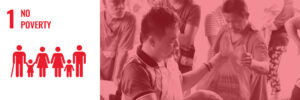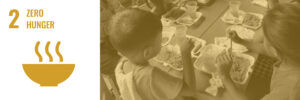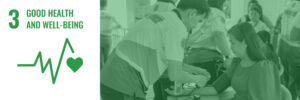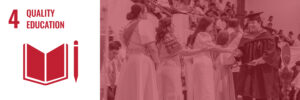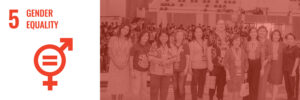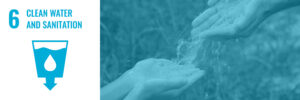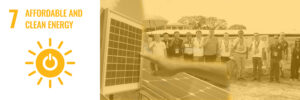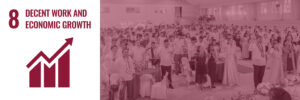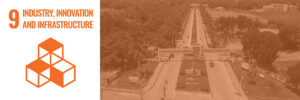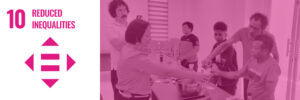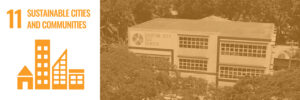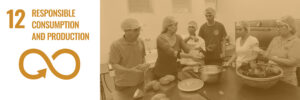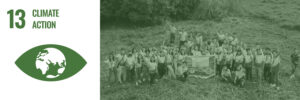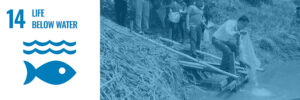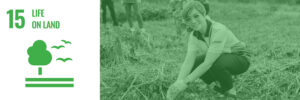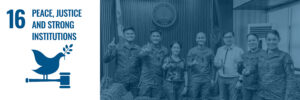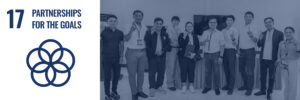2023 – Research | SDG 11 – Sustainable Cities and Communities
Social Research Category
Closer Look to Explore the Knowledge, Skills & Attitude (KSA) on the Faculty Community Engagement of the College of Business, Accountancy & Public Administration (CBAPA) Isabela State University (ISU) Echague, Isabela
Study 2: Core and Soft Skills
Proponents: Amie G. Bala, MBA, Ralliegh F. Vizcarra, RMT, Ph.D., DBA, DPA
Abstract
This study explores the role of core and soft skills in enhancing the community engagement of faculty members at the College of Business, Accountancy, and Public Administration (CBAPA) at Isabela State University (ISU). Faculty involvement in extension activities is crucial in bridging academic knowledge and local community needs. However, there is a gap in understanding the competencies that contribute to impactful community engagements. This research evaluates the proficiency of CBAPA faculty in critical knowledge areas such as communication, people management, and problem-solving which are vital for successful community outreach. Utilizing a mixed-method approach, the study assesses the faculty’s motivation, collaboration efforts, and institutional support to develop a conceptual framework aimed at fostering sustained and meaningful community involvement. Findings suggest that while faculty members demonstrate strong communication and collaboration skills, there is room for improvement in technological proficiency and problem-solving. The study underscores the need for targeted faculty development programs to enhance both core and soft skills, thereby promoting a more structured and effective approach to community engagement. The outcomes provide insights into designing professional development initiatives that align faculty competencies with the demands of community extension activities.
Closer Look to Explore the Knowledge, Skills & Attitude (KSA) onTAMAN the Faculty Community Engagement of the College of Business, Accountancy & Public Administration (CBAPA) Isabela State University (ISU) Echague, Isabela Study
Study 3: Attitudinal Traits, Challenges and Supports
Proponents: Amie G. Bala, MBA, Ralliegh F. Vizcarra, RMT, Ph.D., DBA, DPA
Abstract
Community engagement is a critical aspect of higher education, facilitating the connection between academic institutions and their surrounding communities. This study aims to develop a comprehensive framework that examines the attitudinal traits, challenges, and support systems influencing the effectiveness of faculty extensionists at the College of Business, Accountancy, and Public Administration (CBAPA) of Isabela State University (ISU). Key attitudinal traits such as adaptability, collaboration, and accountability were explored alongside challenges like resource limitations, bureaucratic barriers, and post- pandemic restrictions. The study utilized a mixed-method approach, incorporating structured questionnaires and thematic analysis to assess faculty experiences and the support mechanisms available for community engagement. Results highlight the importance of internal and external linkages, as well as institutional support in enhancing faculty efforts. By identifying the traits, challenges, and support systems that shape faculty extensionists’ experiences, this research provides valuable insights into improving community engagement practices within academic settings.
Credit Risk Management of Agricultural Cooperatives in the Province of Isabela during COVID-19 Pandemic
Proponent: Fler L. Madayag
Abstract
Cooperatives are an integral part of the economic framework. They are an important source of finance for people and companies of all kinds, acting as a safety net for savings. During the period of covid-19 pandemic, these cooperatives are exposed to credit risk. Since implementing risk management techniques are expensive, cooperatives have found it difficult to mitigate credit risk, which might lead to a spike in delinquency rates and cause issues for the cooperatives’ financial position. This study, which combined qualitative and quantitative methods, examined the cooperative’s exposure to credit risk, its effectiveness in implementing credit risk management strategies, and the challenges that these sixteen agricultural cooperatives in Isabela encountered in mitigating credit risk. A four-point Likert scale survey questionnaire, an open and closed-ended interview questionnaire, and information from financial statements and annual reports were used to collect data. The study’s findings revealed that agricultural cooperatives in Isabela are exposed to low level of credit risk. It also showed that a broad spectrum of activities, including identification, evaluation, and mitigation, had been implemented to reduce credit risk. Furthermore, even if the majority of cooperatives have successful credit risk management, the cooperative still face various challenges in implementing risk management.
Extension
OK si SK Harnessing the Potentials of SK Chairpersons in Digital TECHNOLOGY
Proponents: Heherson B. Albano, Vince Lloyd Q. Balisi, Ivy M. Tarun, Madeline M. Taggueg, Rosemary L. Buraga, Mario T. Umayam, Dominic C. Cabauatan
The ‘OK si SK” project strives to empower Sangguniang Kabataan (SK) Chairperson in Cabagan, Isabela, enhancing their digital skills for community development. In the digital age, proficiency in technology is crucial for young leaders to effectively address constituents’ needs. The project provides training workshops covering photo editing, video editing, and web-based document management for SK Chairpersons barangays in Cabagan. Post-evaluation assesses service delivery and participant improvement . Results reveal positive feedback on content, speakers, coordination and timeliness. Evaluations indicate substantial knowledge and skill enhancements among participants. Acquired skills aim to strengthen SK Chairpersons’ roles in local governance, fostering transparency, accountability, and digital empowerment among Cabagan’s youth leaders. “OK si SK” illustrates how targeted training equips youth leaders with digital proficiencies necessary to champion community concerns effectively. The Projects align with SDG Goals, especially SDG 4 (Quality Education), SDG 11 (Sustainable Cities and Communities), and SDG 17 (Partnerships for the Goals). Ultimately, “OK si SK” s to achieving these SDG Goals by empowering youth leaders to address community challenges using digital tools.
PSYCHOLOGICAL FIRST AID TRAINING-WORKSHOP: A RESPONSE IN THE NEW NORMAL
Proponent: Beverly Gay N. Cambri
Psychological First Aid (PFA) is a vital component of community-based mental health support, particularly in the aftermath of crises or disasters. The PFA training workshop aimed to equip the participants with the skills and knowledge to address the mental health consequences of responding to disasters and public health emergencies; deliver psychological and social support for males and females in crisis situations; and simulate the three action principles of ‘Look, Listen and Link’. PFA training-workshop fostered knowledge and understanding of psychological first aid principles, which contributes to achieving SDG 4. The workshop, conducted as part of a larger community resilience-building initiative, incorporated a multidisciplinary approach to understanding the psychological and emotional needs of individuals affected by various stressors, ranging from natural disasters to pandemicrelated challenges. It integrated interactive discussions, case presentations, sharing of personal experiences and group activities that enhanced the practical applications of PFA skills. By promoting mental well-being, it contributes to achieving SDG 3, which aims to ensure healthy lives and promote well-being for all at all ages. The Psychological First Aid training-workshop was conducted on February 15-16, 2023 to forty Barangay Heath Workers and Nutrition Scholars from twenty barangays of Sta. Maria, Isabela. The training-workshop provided these local frontline workers with the knowledge and skills necessary to provide immediate emotional and psychological support to community members during times of distress. A case presentation and feedback giving were conducted last May 19, 2023 to the BHW and BNS participants. The participants shared their experiences on how they were able to assist and help their constituents using the principles of Psychological First Aid. Psychological First Aid training-workshop is a vital tool for addressing multiple Sustainable Development Goals. The training-workshop focused on helping and assisting the constituents of Sta. Maria, Isabela. It helped build resilience within communities, making them better prepared to respond to crises and ultimately advancing SDG 11, which aims to make communities and human settlements inclusive, safe, resilient, and sustainable.
PROGRAM/PROJECT TITLE: RESILIENCE-BUILDING AMONG SMALLHOLDER FARMERS OF SELECTED UPLAND FARMING COMMUNITIES IN THE PROVINCE OF ISABELA, PHILIPPINES
The smallholder upland farmers in Isabela, Philippines are one of the most vulnerable sectors to external shocks such as pandemic, climate change and natural calamities, particularly typhoons. As external shocks are inevitable, there is a need to build the resilience of agricultural sector especially in developing nations such as the Philippines particularly the vulnerable farmers in the uplands farming communities in the country through redesigning of their agricultural production systems that are based on the sustainable use of natural resources such as agroforestry system. This proposed capacity development project aims to increase the resilience of vulnerable smallholder farmers in the uplands from critical and pervasive threats of COVID-19 pandemic and natural disasters. There are policy assessments done and proposed specific suggestions for institutionalization of agroforestry in the area. The conduct of multiple trainings such as workshops and training of trainers enhanced and encouraged the farmers to be more engaged with the proposal of the demonstration farms which are now present in certain areas of the upland barangays.
SDG Addressed: SDG 1 – No Poverty; SDG 2 – Zero Hunger; SDG 11- Sustainable Cities and Communities; SDG 13 – Climate Action; SDG 17 – Partnerships for the Goals
6P’s Per Objectives:
This proposed capacity development project aims to increase the resilience of vulnerable smallholder farmers in the uplands from critical and pervasive threats of COVID-19 pandemic and natural disasters. The project specifically aimed to:
- build the knowledge and skills of upland smallholder farmers, farmer organizations, and local government units in the design and establishment of appropriate agroforestry systems in their local communities (People Services, Places and Partnerships) ;
- utilize and strengthen the resources and capacity of local multi-stakeholders respectively, for collaborative resilience-building projects (People Services, Places and Partnerships) ; and
- formulate policy recommendations for institutionalization of adaptive and resilience-building programs (Policies, Publication)

